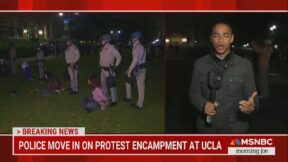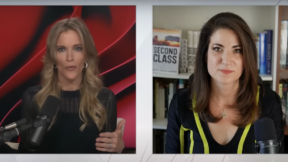CNN’s Brian Stelter Breaks Down the ‘Questionable Editorial Decisions’ in Kavanaugh Coverage
On CNN’s Reliable Sources on Sunday, host Brian Stelter examined the question of whether the media lowered their standards in publishing or reporting some stories about Brett Kavanaugh during the confirmation process. Stelter asked New York Magazine‘s Olivia Nuzzi, former CNN anchor Frank Sesno, and White House reporter and CNN analyst April Ryan if the media “worked with” Democrats take Donald Trump‘s Supreme Court nominee down.
“I have to ask this question,” said Stelter introducing the discussion. “Has the news media come out of this controversy looking better or worse? Because I’m pretty sure we don’t look better.”
First he spoke with Nuzzi, who said that Trump’s feeling that he had a good week is “very unusual” considering his nominee was investigated and the New York Times story about Trump’s finances and taxes. She said it wouldn’t be considered a good week under “normal” circumstances but for Trump’s standards it was considered positive. She did not address the theme of the press or their coverage at that point, but later in the clip.
Stelter turned to Sesno and said that “this controversy involving Kavanaugh only occurred because of the press, because of the Washington Post story Ford, the New Yorker story about Deborah Ramirez. There’s been so much reporting and frankly, Frank Sesno, some misreporting.”
“Do you think the press is coming out of this looking weaker,” he asked, “Because many people feel that the press chose a side through this?”
“Yes,” said Sesno. “Certainly that’s the way it’s going to look to Trump supporters and to people who have been questioning media’s bias and their ability to report straight for a long time.”
Sesno then pointed out what he obviously considered reporting in this very segment. “By any reasonable measure, this has been an extraordinary week for this President,” he said, obviously in contradiction of Nuzzi. He cited the trade deal with Mexico and Canada, the new unemployment numbers “that haven’t been this low since 1969” and the successful appointment to SCOTUS as examples of that “extraordinary” week, and then said that “the coverage has been unrelentingly negative.”
“Even Joe Scarborough goes on the air and says the mainstream media were unfair towards the President,” said Sesno. “I think the challenge grows even greater for the media to figure out where it’s going and to try to find some balance in all of this.”
Stelter played a clip of CNBC’s Sara Fagan, who said on MSNBC that “20 years ago, no major news publication would have published those second allegations. The second allegation or third allegation. And so we are now in a different place in this country.” He asked Sesno if that is true.
“Absolutely. Absolutely. I was bureau chief here at CNN during the Lewinsky thing. We had a whole series of procedures to make sure that hearsay didn’t get on the air, and that we were going to confirm it ourselves before we put it on the air,” said Sesno. “That’s completely been overtaken by events now, with social media..”
Asked what confirming means these days, Sesno gave examples of what corroboration is supposed to consist of, and said “some of these other things? I agree, we would not have reported in the ‘old days’.”
“Let me take you through some of the other examples,” said Stelter to the group. “We mentioned the New Yorker story, that’s the Ramirez story. Ronan Farrow and Jane Meyer interview her on the record, but some people said ‘hey the New Yorker” shouldn’t have published the story because there wasn’t enough supporting evidence. Then there was the New York Times report about a bar fight in 1985.” He explained that they had to apologize for having the story co-written by someone who had already written in opposition to Kavanaugh.
He said MSNBC’s interview with Julie Swetnick, Michael Avenatti‘s client, was something that NBC didn’t know what to do with.”
“They tried to verify her claims, they couldn’t,” he said. “This is another example of… in a prior generation, maybe the interview wouldn’t have aired at all.”
Nuzzi disagreed, saying there is no real value in comparing to the Clinton days, and that it’s “up to the reader, up to the viewer” to decide if the story is credible. She said that the New Yorker story was “pretty carefully written” and had “caveats in there.”
“I think that the press was trying in a very hurried way to do serious reporting and to really vet this nominee,” she said. “I think some mistakes were made.” Nuzzi did not offer any examples of those mistakes.
Stelter brought up some of the most controversial decisions made, and did ask the question about media bias, but he also left out CNN’s own publication and on-air discussion of an allegation against Kavanaugh that had already been retracted before they ran with it. And although he mentioned ‘misreporting” there was no account of which reports were in error. It was a decent but incomplete analysis.
Watch the clip above, courtesy of CNN.
[Featured image via screengrab]
—
Follow Caleb Howe (@CalebHowe) on Twitter
Have a tip we should know? tips@mediaite.com






